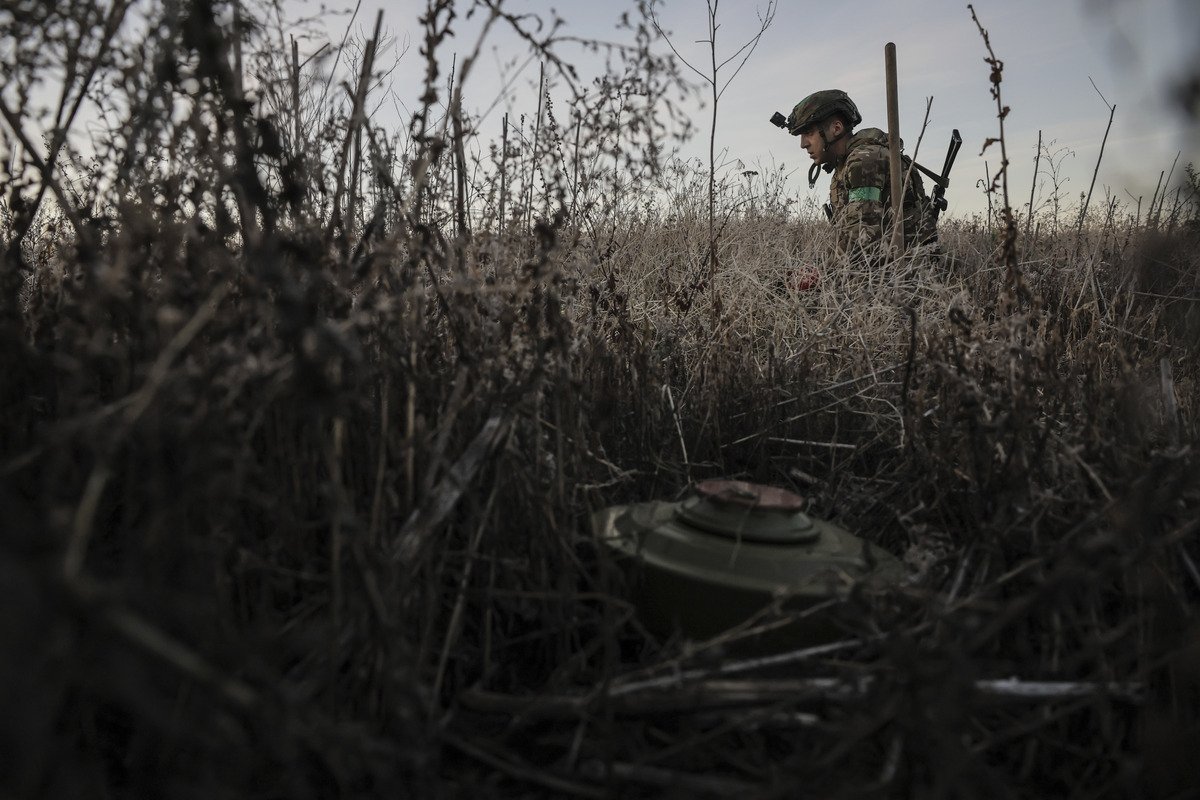The U.S. will send antipersonnel land mines to Ukraine in the second major policy shift from the winding-down Joe Biden administration in only a few days, although it remains to be seen just how much of a difference these mines will make in the face of Moscow's advances.
President Biden, who is in a last-ditch effort to supply Ukraine in his final two months in office, greenlit the supply of antipersonnel land mines to Kyiv, a U.S. defense official told Newsweek. The mines will become inactive after a predetermined period of time, the official said. Ukraine has committed not to use the mines in densely populated civilian areas, the official added.
U.S. officials told The Washington Post, which first reported on the approval, that the Pentagon assesses the mines could be one of the most effective ways to slow Russia's attacks, which have yielded battlefield gains in the east throughout the year.

Land mines can be effective military tools, but are controversial among human rights groups as they can pose a danger to civilians for a long time. They are banned by over 150 countries, although this does not include Russia or the U.S.
The latter has already furnished Ukraine, which is the most mined country in the world, with land mines designed to take out armored vehicles and tanks. Russia has reportedly used more than a dozen types of antipersonnel land mines in Ukraine, according to Human Rights Watch.
The HALO Trust, a humanitarian NGO that works to clear land mines, said in a statement shared with Newsweek that the possibility of more antipersonnel land mines in Eastern Europe was a "clear and present danger," adding it "regrets that the course of the war requires defensive measures of this kind."
The organization estimated that there has been more than 2 million land mines in Ukraine since February 2022, adding it will continue its work demining in the country after the U.S. government's decision.
The Biden administration said in June 2022, shortly after the start of the full-scale war in Ukraine, that it was "committing to limit the use of antipersonnel land mines."
Biden believed they have "have disproportionate impact on civilians, including children, long after fighting has stopped," the White House said in a statement.
The administration pledged not to export or transfer antipersonnel land mines, "except when necessary for activities related to mine detection or removal, and for the purpose of destruction." It also committed to destroying all its antipersonnel land-mine stockpiles, apart from those needed by South Korea.
"Ukraine joins U.S. ally South Korea as only one of two countries with authorization to use American antipersonnel mines," Ukraine's SPRAVDI center, established by Kyiv's government to counter misinformation, said on Wednesday.
Moscow has been slowly, but steadily, advancing in eastern Ukraine throughout 2024, focusing its attacks on the country's Donetsk region while launching a cross-border offensive into the northeastern Kharkiv region in May.
The Kremlin claimed the former Ukrainian stronghold of Avdiivka in February, and has moved into Chasiv Yar and Toretsk, although it does not fully control these Donetsk settlements. It has been inching toward Pokrovsk, a Ukrainian strategic hub not far from Donetsk's western border with the Dnipropetrovsk region.
Russia's Defense Ministrysaid on Wednesday that its troops had captured Ilyinka, a village southeast of Pokrovsk.
"Russia is attacking Ukrainian lines in the east with waves of troops, regardless of the casualties that they're suffering," one official told The Post. "So the Ukrainians are obviously taking losses, and more towns and cities are at risk of falling. These mines were made specifically to combat exactly this."
"It's not a game-changing weapon," Ivan Stupak, formerly of Ukraine's SBU security service, told Newsweek. Ukraine would also need several thousands of antipersonnel land mines to spread across the hundreds of miles of front line for the explosives to make a difference, Stupak said.
Earlier this week, U.S. officials said Washington had approved Ukraine using long-range American missiles against Russian soil, which it had long refused to do.
Russia said on Tuesday that it had recorded the first Army Tactical Missile System, or ATACMS, launch against its territory.
"ATACMS fragments fell on the technical territory of a military facility in the Bryansk region, a fire broke out, it was extinguished," the Russian Defense Ministry said.
"The multiple use of ATACMS in the Bryansk Region last night signals a desire for escalation," Russia's longtime Foreign Minister Sergey Lavrov said during an appearance at the G20 group of nations' summit in Rio de Janeiro, Brazil, on Tuesday.
As Ukraine marked 1,000 days since the start of Russia's full-scale invasion on Tuesday, Russian President Vladimir Putin rubber-stamped changes to the country's nuclear doctrine. Russia can now justify a nuclear strike against a nation without nuclear weapons, if that country attacks Russia and is backed by a nuclear power, according to the updated Kremlin document.
With two months until President-elect Donald Trump is inaugurated, there are deep concerns among Ukraine's supporters over what the new year will bring for Kyiv's military supplies. Ukraine is heavily dependent on the U.S. for military aid, which accounts for roughly half of all military assistance heading into the war-torn country.
Trump has said he will turn off the flow of military aid, and that he can end the war in a day once he returns for his second term in the Oval Office. Officials and experts across Europe anticipate this could mean doing a deal with Putin, which would likely be unsavory to Kyiv.




















 English (US) ·
English (US) ·